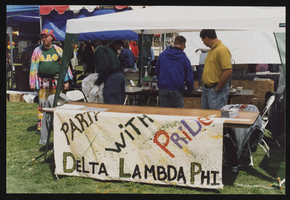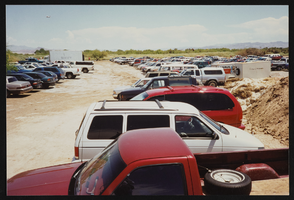Search the Special Collections and Archives Portal
Search Results
H. P. Fitzgerald oral history interview
Identifier
Abstract
Oral history interview with H. P. Fitzgerald conducted by Kathlyn Wilson on March 09, 1975 for the Ralph Roske Oral History Project on Early Las Vegas. Fitzgerald discusses black history in Las Vegas, Nevada. He also talks about school integration and being one of the first black administrators for Clark County School District.
Archival Collection
G. L. Vitto oral history interview
Identifier
Abstract
Oral history interview with G. L. Vitto conducted by Phil Sabol on March 01, 1979 for the Ralph Roske Oral History Project on Early Las Vegas. In this interview, Vitto discusses his personal history.
Archival Collection
Elgin Holbert Jr. oral history interview
Identifier
Abstract
Oral history interview with Elgin Holbert Jr. conducted by Claytee D. White on April 28, 2021 for African Americans in Las Vegas: a Collaborative Oral History Project.
Elgin Holbert Jr. discusses growing up in the Westside community of Las Vegas, the activities he participated in as a child, community leaders he admired, and his observations of mixed family life (as his father was Black and his mother was white). Elgin also speaks of his work as a Red Cap on the Union Pacific Railroad (UPR), his time at Nevada Power, and his experience dealing cards at various Las Vegas casinos including the Riviera Hotel and Casino (for 15 years), the Tropicana Las Vegas (for 15 years), and the Treasure Island Hotel (for 20 years).
Subjects discussed include: Viola Cunningham; Union Pacific Railroad; Riviera Hotel and Casino; Tropicana Las Vegas Hotel Casino; Treasure Island Hotel; Cotton Bowl; Jimmy Gay; Jefferson Recreational Center; and Eleanor Walker
Archival Collection
Gay Kauffman Nevada Test Site Papers
Identifier
Abstract
The collection includes materials from the Nevada Test Site (1955-1967) including newsletters published by the Reynolds Electrical & Engineering Co., Inc. and photographs of Southern Nevada flora, fauna, and archaeology. It also includes photographs of test explosions at the Nevada Test Site, as well as photographs documenting a visit from North Atlantic Treaty Organization (NATO) officials and a visit from John F. Kennedy to the Nevada Test Site. The collection also contains an oversized poster of an atomic explosion and one of a nuclear rocket development station.
Archival Collection
Katherine L. Rankin oral history interview
Identifier
Abstract
Oral history interview with Katherine L. Rankin conducted by Claytee D. White on June 16, 2014 for the Boyer Early Las Vegas Oral History Project. In the interview, Rankin discusses her childhood, her move to Las Vegas, Nevada, and her career as a librarian. Rankin talks about how she began her library career on the Gila River Reservation in Arizona before accepting a position as an audio and visual materials cataloger at University of Nevada, Las Vegas (UNLV) in the 1970s. Rankin later describes her work with the American Library Association, getting tenure at UNLV, and her role as a map cataloger in UNLV Special Collections and Archives.
Archival Collection
J. K. Russ oral history interview
Identifier
Abstract
Oral history interview with J. K. Russ conducted by Claytee D. White on December 22, 2017 for the Remembering 1 October Oral History Project. In this interview, Russ discusses her early life in New Zealand and growing up on a tobacco farm. She remembers arriving to the United States and establishing a career as an artist. Russ talks about the 1 October shooting, creating an art exhibit using cards and letters received from people all over the world, and Las Vegas’ response to the tragedy. Lastly, Russ describes the art community in Las Vegas and the Arts District.
Archival Collection

Delta Lambda Phi booth at Gay Pride: photographic print
Date
Archival Collection
Description
Image
Halloween at various Las Vegas, Nevada gay bars, 1999
Level of Description
Archival Collection
Collection Name: Las Vegas Bugle Collection on Lesbian, Gay, Bisexual, and Transgender History
Box/Folder: Box 03
Archival Component
Vegas PBS Interviews for the African Americans in Las Vegas: a Collaborative Oral History Project
Identifier
Abstract
Oral history interviews with Ruby Amie Pilot, Eva G. Simmons, Melvin Sanders, Jarmilla McMillan-Arnold, Hannah Brown, Sonny Thomas, and Claytee White conducted by Vegas PBS on April 01, 2013, April 02, 2013, April 12, 2013, and November 19, 2013 for the African Americans in Las Vegas: a Collaborative Oral History Project. In these interviews, the participants discuss their early lives and moving to Las Vegas, Nevada. Pilot talks about segregation on the Las Vegas Strip, integration, and the importance of church activities in the African American community. Simmons describes her career as a teacher, the schools on the Westside, and businesses on Jackson Street. Thomas describes the funeral industry and his role as a funeral director. McMillan-Arnold talks about segregated Las Vegas, African American entertainers, and the issue of homelessness on the Westside. Brown remembers growing up on the Westside, segregated schools, and her role as President of the National Coalition of 100 Black Women – Las Vegas chapter. Lastly, Sanders discusses his childhood in Las Vegas, being the son of a preacher, and the redevelopment of the Westside.
Archival Collection

Parking lot at Gay Pride: photographic print
Date
Archival Collection
Description
Gay Pride 1997 (Dennis McBride, photographer) Gay Pride 1997 at Sunset Park; parking lot.
Image
